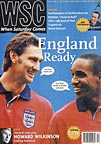 Their was shock when Portugal won the rights to stage Euro 2004, but as Phil Town explains, it won't be an easy ride
Their was shock when Portugal won the rights to stage Euro 2004, but as Phil Town explains, it won't be an easy ride
Portuguese emotions have been on a veritable roller-coaster ride of late. The plight of its ex-colony East Timor cut the national psyche deep, then the island’s resistance leaders visited and the streets of Lisbon were paved with petals. Spirits plunged again with three days of mourning for the singer and national institution Amelia Rodrigues, but straight away football dragged the nation back up by its bootlaces.
The campaign to win the nomination was long and hard-fought. Their rivals were the joint bid from Austria and Hungary, and the old enemies Spain, who were the major threat. Spain had the experience of hosting big sporting events, a vibrant domestic championship and all the necessary facilities pretty much in place. Portugal had a decaying pool of inadequate stadiums and a patchy infrastructure, and its football is as near as dammit completely skint.
A foregone conclusion, then. Well, not for the Portuguese federation, who went for it with a vengeance. The first task was to find someone to steer the ship. Step up Carlos Cruz, a TV personality most famous for hosting the Portuguese version of game show 3,2,1. But he’s a shrewd cookie, and he and his team designed a very slick marketing campaign. There was a simple slogan (“We Love Football”) and a very fetching logo, which 34,000 people famously reproduced in June on the pitch at the national stadium. And then there were some heavyweight endorsements from Ronaldo, Eusébio of course and, er, Pavarotti.
But still, come the day of the decision it all seemed cut and dried. Straw polls in the German town of Aachen, where the voting took place, suggested Spain had 11 of the possible 16 votes. The Portuguese press was more or less conceding defeat, the Spanish rather inelegantly proclaiming victory. Then the result: Portugal ten, Spain four, Austria/Hungary two – a troun- cing! The suggestion was that Portugal had been given the nod because of UEFA’s desire to develop the game here, but the Spanish were, perhaps understandably, not a little miffed by the abrupt turnaround. The Portuguese were simply gobsmacked.
Now that the buzz has worn off, however, the feeling has become more one of “Cripes, what do we do now?” Two hundred million quid has to be found from somewhere to build five stadiums and upgrade five more. Protocols were apparently signed between the government, clubs and local authorities to share the costs, but already some of the clubs are grumbling. Benfica, in particular, have trouble settling transfer payments and even paying wage bills and now it has to find the cash to put a roof on the Luz.
There are other major worries. While it may be true that the Portuguese “love football”, actually going to games is a different matter. At the moment, clubs like Farense of the Algarve, Leiria and Beira Mar attract maybe a couple of thousand to routine league games, yet all are to have new stadiums holding 30,000.
Other major footballing events held here have been hit-and-miss. The 1991 World Youth Cup saw Portugal beat Brazil in the final in front of 120,000 at the Luz. But there were a meagre 10,000 or so rattling round inside the same stadium for the 1992 Cup-Winners Cup final (Werder Bremen v Monaco). Nor is the decision to base all the tournament centres in the coastal regions a politically popular one, exacerbating as it surely will the social desertification of the interior. Finally, the big doubt: will everything be ready in time?
There is already a great deal of scepticism flying around, but it was the same for Expo 98 in Lisbon. After some major hiccups this event just about got off the ground on schedule and proved a fair success. The less cynical of us have the same hopes for Euro 2004. With a bit of luck and a following wind, that is.
From WSC 154 December 1999. What was happening this month